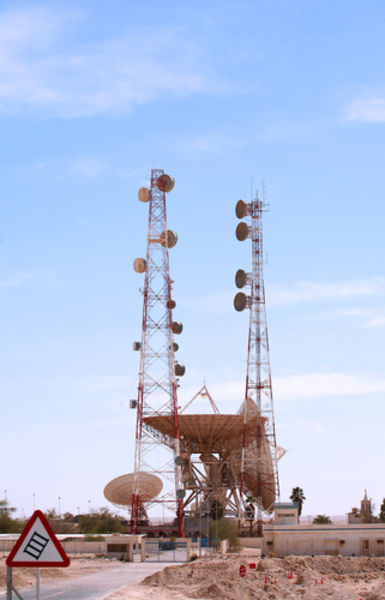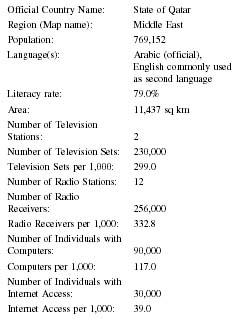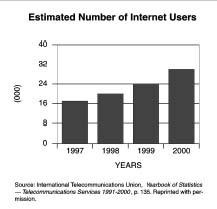Qatar


Basic Data
| Official Country Name: | State of Qatar |
| Region (Map name): | Middle East |
| Population: | 769,152 |
| Language(s): | Arabic (official),English commonly used as second language |
| Literacy rate: | 79.0% |
| Area: | 11,437 sq km |
| Number of Television Stations: | 2 |
| Number of Television Sets: | 230,000 |
| Television Sets per 1,000: | 299.0 |
| Number of Radio Stations: | 12 |
| Number of Radio Receivers: | 256,000 |
| Radio Receivers per 1,000: | 332.8 |
| Number of Individuals with Computers: | 90,000 |
| Computers per 1,000: | 117.0 |
| Number of Individuals with Internet Access: | 30,000 |
| Internet Access per 1,000: | 39.0 |
Background & General Characteristics
Qatar, which became independent from British protection in 1971, is located on the east coast of the Arabian Peninsula. The territory includes the mainland and a number of small islands. It is bounded by Saudi Arabia and the United Arab Emirates to the south and by the Persian Gulf to the north, east and west. Qatar itself is a peninsula that extends northward covering an area of 11,437 square km. Over 600,000 people, who speak primarily Arabic and English as a second language, live within the 114 square miles of its borders. Although Qatar is a member of the Gulf Cooperation Council (GCC), its constitutional monarchy has a more liberal political system than other countries in the Gulf States. The government decreed a ban on media censorship in 1995 and abolished the Ministry of Information (1998), and women in Qatar were granted the right to vote and be elected in Qatar's first democratic "municipal elections" in 1999. Revenue from oil—first discovered in Qatar in 1939—has transformed it from one of world's poorest countries to one with a very high per capita income, and has supported the development of an urbanized populace with many media options.
Print Media
Print media was the first to take hold in Qatar with the governmental publication of an official gazette that contained the laws and Emiri's decrees in 1961. In 1969, Qatar established the Department of Information, which issued Doha magazine the same year. In 1970 The Ministry of Education issued Education magazine.In 1970, Al Urooba press and Gulf News , a bimonthly English language magazine, were published as the first private press in Qatar.
Al Arab newspaper, which began publishing in 1972, was the first political daily, and Al Ahd press was the first political weekly. In 2002, in addition to the government-owned newspapers, there were seven privately owned publications. The privately owned publications were Al-Raya, Al-Sharq, Al-Watan , Arabic language newspapers; The Gulf Times and The Peninsula , English language newspapers; and Qatar Al-Khair and Al-Doha Lil-Jamiah , magazines publishing news, including politics, business, social, finance, health, art and entertainment. For many years, the Qatari government provided a financial support for local newspapers and press. However, this was stopped in 1995, the same year that media censorship was lifted. This left the press essentially free from government interference and many national and international newspapers an magazines started to appear in the Qatari market such as the New York Times, Time magazine, Financial Times and Alquds Alarabi .
State-Press Relations
Government control of the media has varied since the establishment of the monarchy. The Department of Information was established in 1969, and was replaced by the Ministry of Information and Culture in 1972. In 1975, a separate department was added to the ministry— the Qatar News Agency. The press and publication law, the first official censorship from the government to control the media and populations, was issued in Qatar in 1979. It was aimed at regulating the relationship between the state and press establishment, printing, publishing and distributing houses, libraries, bookshops, artistic production sale outlets, and publicity and advertisement agencies. For example, the law banned many newspapers and books from access to the country because they did not agree with the government's political, economic, or religious perspective. Censorship was lifted in 1995 when a new, much more liberal, Press and Publications law was enacted. The new press and publication law has continued to be updated since 1995. Qatar abolished the Ministry of Information and Culture in October 1998. The ministry's department and responsibility were first transferred to the number or government bodies.
Broadcast Media
Radio was introduced to the nation on June 25, 1968 when the state-run Qatar Broadcasting Service (QBS) began airing radio programming in Arabic languages. English, Urdu, and French programming were added to the line up in 1971, 1980, and 1985 respectively. Qatar radio includes all programming formats, including music, news, and entertainment. There is no private radio in Qatar—it is all state-run. However, international radio stations such as the British Broadcasting Corporation (BBC) and Voice of America are available.
Radio was followed by the introduction of television, with a single channel that broadcast black and white programming for three to four hours a day in 1970. The channel began color transmissions in 1974. A second, English-language channel was launched in 1982 and the Qatar television satellite channel went on the air in December 1998. Like radio, all television channels were government-owned except Al-Jazeera satellite channel, which was introduced in 1996. Al-Jazeera TV was considered a private entity even though the Qatari government originally financed it.
The first wireless cable television system, which was known as Qatar Cablevision (QCV), used state-of-the art technologies to deliver satellite television to homes in Qatar beginning in 1993. QCV provided 31 channels such as CNN, BBC, Fox Sports, and Arab satellite channels. The Qatar Public Telecommunications Corporation (Q-Tel) is the government-owned monopoly provider of telecommunications services and owns the entire IT infrastructure in Qatar. The Internet service was started by Q-Tel in May 1996. The remainder of the users were evenly split between commercial and personal use. Before the service went public, Q-Tel experimented with using a proxy server to preclude access to undesirable material. Today the company is using their routers as firewalls to block access to undesirable sites and protect their network against hackers.
The Story of Al-Jazeera
Al-Jazeera is perhaps the most well known and most popular Arabic satellite channel. In 1996, Qatar introduced Al-Jazeera as the first Arab all-news and public affairs satellite network. It is the only Arabic news channel in the Middle East offering news coverage 24 hours a day from around the world, with a focus on the hottest regions of conflict. Programming includes a wide selection of political talk shows and documentaries with uncensored debates covering events as they happen.
Al-Jazeera provides a forum for freedom of expression in the region by showing free-ranging political debates, including interactive debates with live phone-ins from guests and viewers. Although Al-Jazeera is very popular with the general public, most Arab governments and state-run media do not have as favorable an opinion. The network has been subjected to attacks from almost every newspaper, television and radio station, as well as Internet sites in the majority of Arab countries and the Middle East.
Al-Jazeera became popular because it reflected the thirst of Arabs for impartial information, of which they were often deprived through their regimes' media. It also reflected the eagerness of Arabs to eradicate traditional forms of censored media output. Arab people trust its news and programs. It has stolen Arab television audiences from every one of the big powers in the region with its debates, uncensored news and, lately, online polling.
The Qatar government began Al-Jazeera after years of study by the BBC. The BBC was already popular in the Arab World and known for its reliable service. Al-Jazeera operates on a Western news model, much like CNN and BBC. However, Al-Jazeera does not follow the standard measures when recruiting editors and announcers. They have set other rules, which are not accepted by other channels, such as not being employed by a TV channel, the ability to argue, well-versed in the English language, and possessing computer and other technical skills. News submitted by a worldwide pool of correspondents is produced and coordinated by a number of chief editors from different Arab countries. Each is in charge of a group of news bulletins that are scheduled throughout the day, with an emphasis on variety throughout the day.
The Impact of Al-Jazeera In the Arab World Even though Al-Jazeera is the most popular television network in Arab media history, it is involved in conflicts with many Arab countries such as Kuwait, Jordan, Libya, Tunisia, and Egypt. All of these countries have attacked the Al-Jazeera channel because if its editorial content. The Jordanian government closed down Al-Jazeera's news bureau in Amman after a talk show guest accused the late King Hussein of collaborating with Israel. Kuwait's information minister was sent to Qatar in 1997 to complain about an Al-Jazeera program in which the Kuwaiti ruling family was insulted. Additionally, a Kuwaiti judge tried to force Al-Jazeera to pay damages for a report on the alleged killings of Palestinians, Iraqi and Kuwaiti collaborators after the Persian Gulf War. Palestinian Council President, Yasser Arafat's, forces closed the network's office in Ramallah on the West Bank, because of anger over archival footage in a documentary on the Lebanese civil war. Iraq protested Al-Jazeera coverage of the extravagant celebration of Saddam Hussein's birthday while Iraq claimed that its people were dying from hunger because of United Nation sanctions. Algeria and Morocco have ordered Al-Jazeera correspondents to stop working. The Egyptian government was furious with Al-Jazeera because of critical coverage of the country's last elections and because of stories about Egypt allegedly bowing to American pressure over the Palestinian issue. Like any uncensored news channel, the network has its critics inside and outside the station.
Al-Jazeera Around the World After September 11, Al-Jazeera became well-known around the world—and even more important in the Middle East because it was the only station permitted to have a reporter inside the Taliban regime, which controlled Afghanistan. The channel had established a bureau in Kabul in 2000, at a time when no other news organization was interested in that part of the world.
Few in the West had heard of Al-Jazeera, which operates from cramped, heavily fortified studios on the outskirts of the Qatar. But when the station started broadcasting video statements by Osama bin Laden and became

Al-Jazeera Website Al-Jazeera launched a companion website ( www.aljazeera.net ) in Arabic in January of 2001. There are plans in the near future to develop an English language version of the site as well. Al-Jazeera maintains a 60-person, independent staff for the website, 36 of who are editors, journalists and researchers. After September 11, the website's traffic doubled, jumping from about 700,000 page views a day to about 1.2 million page views with more than 40 percent of them from the U.S.
The website covers news, sports, entertainment, technology, health, arts and culture throughout the Middle East and around the world. Moreover, it presents in-depth analysis special coverage, book reviews, marketing, and advertising. It also offers user interactivity options like quick vote and discussion forums where the users can express their opinion directly without censorship. The website provides the full script of Al-Jazeera Satellite Channel's main programs, attached with its audio file within 24 to 36 hours from the time of the first broadcasting.
The Al-Jazeera television and website have provided people worldwide new, alternative perspectives on news and information. As a result, the press of the small nation of Qatar has had a major impact on the media of the world.
Bibliography
Al-Jazeera. 2002. Al-Jazeera Net celebrates its first year . 2 December 2002. Available from www.aljazeera.net .
Alterman, J. New Media, New Politics: From Satellite Television to the Internet in the Arab World. Washington, DC: Washington Institute for Near East Policy, 1998.
AL-Tamimi, E. "Mass media and development in state of Qatar." Ph.D. diss., Boston University, 1995.
Boyd, D.A. Broadcasting in the Arab World: A survey of the electronic media in the Middle East. Ames, IA: Iowa State University Press, 1999.
Cable News Network 2001. Al-Jazeera presents Arabic view of war. 6 November 2001. Available from www.cnn.com .
Campagna, J. 2001. Between two worlds: Qatar Al-Jazeera satellite Channel faces conflicting expectation. 12 January 2001. Available from www.cpj.org/Briefings/2001/Al-Jazeera_oct01/Al-Jazeera_oct01.html .
Department of Information & Researches. The Media in the State of Qatar. Doha: Ministry of Foreign Affairs, 2001.
Dobbs, M. "Qatar TV station a clear channel to Middle East." The Washington Post, 9 October 2001, p.1.
El-Nawawy. M. and Iskandar, A. Al Jazeera: How the Free Arab News Network Scooped the World and Changed the Middle East. Boulder, CO: Westview Press, 2002.
Friedman, T. L. "An Arab TV station nourishes democracy.' The New York Times, 27 February 2001, p. 23.
Ghareeb, E. "New media and the information revolution in the Arab World: an assessment." Middle East Journal, (Summer 2000). 54, 395-418.
Ibish, H., and A. Abunimah. "The CNN of the Arab World Deserves Our Respect; Al-Jazeera tells the war story unfiltered." Los Angeles Times, 22 October 2001, p.11.
Ibramim, M. Qatar Television. Doha, 1980.
Khouri, R. "Arab satellite TV: News without impact." The Jerusalem Post, 13 May 2000. p. 6.
Nigel, D. (2000, Aug). Qatar sovereign boosts confidence at a price. Euromoney, 376, 26.
Sakr, N. 2000. Optical Illusions: Television and Censorship in the Arab World. Transnational Broadcasting Studies, 2001. 19 January 2001. Available from www.tbsjournal.com/Articles.htm .
Shadid, A. and G. Staff. "Global impact of Arab media." The Boston Globe, 10 October 2001, p.19.
Sharon, W. "Arab TV's strong signal; The al-Jazeera network offers news the Middle East never had before, and views that are all too common." The Washington Post, 4 December 2001.
Soueif, A. "It provides the one window through which we can breathe." Guardian Newspapers Limited, 9 October 2001, p. 4.
Williams, D. "Al-Jazeera ascends to world stage." The Washington Post, 13 October 2001, p. A22.
Philip J. Auter
Khalid Al-Jaber
Washington Dc
New York
Los angeles
thank you in advance
Aljazeera news channel number please